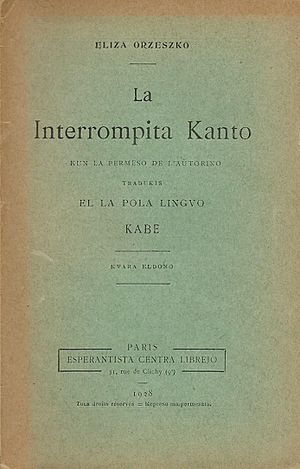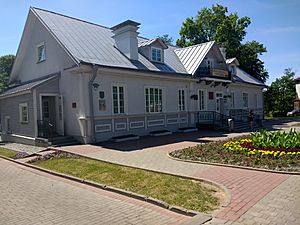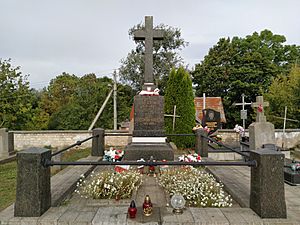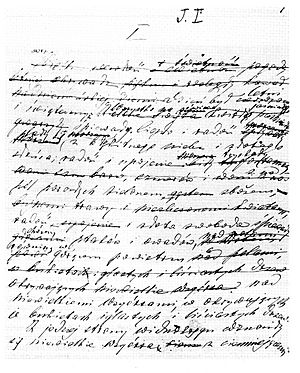Eliza Orzeszkowa facts for kids
{{Infobox writer | name = Eliza Orzeszkowa | image = Eliza Orzeszkowa.PNG | birth_date = 6 June 1841 | birth_place = FETCH_WIKIDATA}}, Russian Empire (now Belarus) Eliza Orzeszkowa (born June 6, 1841 – died May 18, 1910) was an important Polish writer. She was a leading figure in a movement called Positivism. This was a time when people focused on using science and reason to improve society. Eliza wrote during a period when Poland was divided and ruled by other countries. In 1905, she was nominated for the Nobel Prize in Literature, a very famous award for writers.
Contents
Life Story of Eliza Orzeszkowa
Eliza was born in a place called Milkowszczyzna. This area was part of the Russian Empire back then, but it is now in Belarus. She came from a noble family. She later passed away in Hrodna, which is also in modern-day Belarus.
From 1852 to 1857, Eliza lived in Warsaw, the capital of Poland. She went to school there and met another future Polish writer, Maria Konopnicka.
When she was sixteen, Eliza married Piotr Orzeszko. He was a Polish nobleman and twice her age. After a big rebellion against Russian rule called the January Uprising in 1863, Piotr was sent away to Siberia. Siberia is a very cold and distant place in Russia. Eliza and Piotr officially separated in 1869.
Many years later, in 1894, Eliza married again. Her second husband was Stanisław Nahorski, whom she had loved for 30 years. Sadly, he died a few years after they married. In 1866, Eliza moved to Hrodna and began her career as a novelist.
Her Writings and Themes
Eliza Orzeszkowa wrote many stories. She published about 30 novels and 120 shorter pieces, including sketches and novellas. Her writings often explored the social problems in her country, which was under foreign rule.
For example, her novel Eli Makower (1875) looked at the relationships between Jewish people and Polish nobles. Another book, Meir Ezofowicz (1878), discussed the differences between traditional Jewish beliefs and newer, more open-minded ideas.
In 1888, Eliza wrote two famous novels about the Niemen River, which is now in Belarus. Cham (meaning "The Boor") was about the lives of fishermen. Her most well-known novel, Nad Niemnem (meaning "On the Niemen"), explored the lives of Polish noble families. This book is often compared to another famous Polish epic poem, Pan Tadeusz.
Eliza also wrote about important ideas like patriotism (loving your country) and cosmopolitanism (feeling like a citizen of the whole world). All her works were published together in a special collection between 1884 and 1888. Many of her books were also translated into German.
Nobel Prize Nomination
In 1905, Eliza Orzeszkowa was nominated for the Nobel Prize in Literature. She was nominated alongside two other very famous writers: Henryk Sienkiewicz (who wrote Quo Vadis) and Leo Tolstoy (who wrote War and Peace).
The Nobel Prize committee decided to give the award to Henryk Sienkiewicz that year. They felt that dividing the prize between multiple people would make it seem less important.
Selected Works

Here are some of Eliza Orzeszkowa's notable works:
- Obrazek z lat głodowych (1866)
- Marta (1873)
- Eli Makower (1875)
- Meir Ezofowicz (1878)
- Nad Niemnem (On the Niemen) (1888)
- Cham (The Boor) (1888)
- Bene nati (1891)
- Argonauci (The Argonauts) (1900)
- Gloria victis (a collection of novellas) (1910)
She also wrote important non-fiction pieces about social issues:
- Kilka słów o kobietach (On women) (1870)
- Patriotyzm i kosmopolityzm (Patriotism and cosmopolitanism) (1880)
- O Żydach i kwestii żydowskiej (On Jews and the Jewish question) (1882)
See also
 In Spanish: Eliza Orzeszkowa para niños
In Spanish: Eliza Orzeszkowa para niños
 | Kyle Baker |
 | Joseph Yoakum |
 | Laura Wheeler Waring |
 | Henry Ossawa Tanner |




